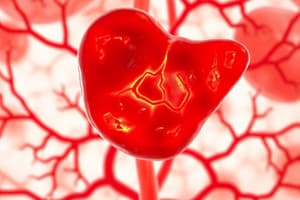Podcast
Questions and Answers
What percentage of instances of fulminant hepatic failure are caused by drugs?
What percentage of instances of fulminant hepatic failure are caused by drugs?
- 60-80%
- 40-60%
- 20-40% (correct)
- 10-20%
What is the main cause of drug-induced liver injury in the United States?
What is the main cause of drug-induced liver injury in the United States?
- Amoxicillin-clavulonate
- Propylthiouracil
- Acetaminophen toxicity (correct)
- HIV co-infection
What is the mortality rate for drug-induced liver injury?
What is the mortality rate for drug-induced liver injury?
- 25%
- 100%
- 75% (correct)
- 50%
What is the boxed warning for propylthiouracil?
What is the boxed warning for propylthiouracil?
What can enhance susceptibility to drugs?
What can enhance susceptibility to drugs?
What can result in abnormal reactions to drugs?
What can result in abnormal reactions to drugs?
What can make consequences of drug-induced liver injury worse?
What can make consequences of drug-induced liver injury worse?
What can cause more injury, long-acting drugs or shorter-acting drugs?
What can cause more injury, long-acting drugs or shorter-acting drugs?
What can result in poor metabolism of antiarrhythmic drug debrisoquine?
What can result in poor metabolism of antiarrhythmic drug debrisoquine?
What can mediate an immune response in drug-induced liver injury?
What can mediate an immune response in drug-induced liver injury?
Flashcards are hidden until you start studying
Study Notes
- Drugs are a major cause of liver injury.
- Over 900 drugs, toxins, and herbs can cause liver injury.
- Drugs account for 20-40% of instances of fulminant hepatic failure.
- Amoxicillin-clavulonate is a common cause of drug-induced liver injury worldwide.
- Acetaminophen toxicity is the main cause of drug-induced liver injury in the United States.
- Physicians must be vigilant in identifying drug-related liver injury.
- Mortality from drug-induced liver injury is high, with 75% resulting in liver transplantation or death.
- The FDA has withdrawn several drugs from the market due to hepatotoxicity.
- Propylthiouracil carries a boxed warning for severe liver injury and acute liver failure.
- Risk factors for drug-induced liver injury include age, alcohol ingestion, and liver disease.
- Liver disease may make consequences of drug-induced liver injury worse.
- Modification of doses in liver disease patients should be based on the specific enzyme involved in metabolism.
- Patients with HIV co-infected with hepatitis B or C are at increased risk for hepatotoxic effects.
- Patients with cirrhosis are at increased risk of decompensation by toxic drugs.
- Genetic differences in P-450 enzymes can result in abnormal reactions to drugs.
- Abnormal expression of P-450-II-D6 can result in poor metabolism of antiarrhythmic drug debrisoquine.
- Persons with AIDS, malnourishment, and fasting may be susceptible to drug reactions due to low glutathione stores.
- Long-acting drugs may cause more injury than shorter-acting drugs.
- Factors that may enhance susceptibility to drugs include host factors.
- Pathophysiologic mechanisms of hepatotoxicity include hepatocellular and extracellular mechanisms, and drug toxicity mechanisms can be divided into drugs that directly affect the liver and drugs that mediate an immune response.
Studying That Suits You
Use AI to generate personalized quizzes and flashcards to suit your learning preferences.




